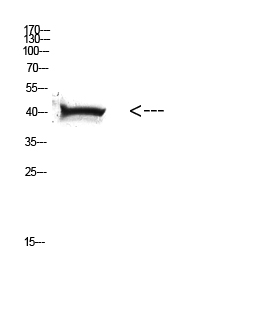
| WB | 咨询技术 | Human,Mouse,Rat |
| IF | 咨询技术 | Human,Mouse,Rat |
| IHC | 咨询技术 | Human,Mouse,Rat |
| ICC | 技术咨询 | Human,Mouse,Rat |
| FCM | 咨询技术 | Human,Mouse,Rat |
| Elisa | 1/10000 | Human,Mouse,Rat |
| Aliases | Aw-68; HLA class I histocompatibility antigen; A-28 alpha chain; MHC class I antigen A*68; HLA-A; MHC class I antigen HLA A heavy chain |
| Entrez GeneID | 3105 |
| WB Predicted band size | Calculated MW: 41 kDa; Observed MW: 41 kDa |
| Host/Isotype | Rabbit IgG |
| Antibody Type | Primary antibody |
| Storage | Store at 4°C short term. Aliquot and store at -20°C long term. Avoid freeze/thaw cycles. |
| Species Reactivity | Human |
| Immunogen | The antiserum was produced against synthesized peptide derived from human HLA Class I. AA range:204-253 |
| Formulation | Purified antibody in PBS with 0.05% sodium azide,0.5%BSA and 50% glycerol. |
+ +
以下是关于HLA-A抗体的3篇代表性文献及其摘要概括:
---
1. **文献名称**:*"HLA antibody detection with single antigen beads compared to conventional methods"*
**作者**:El-Awar, N. et al.
**摘要**:本研究评估单抗原珠(SAB)技术在检测HLA-A抗体中的灵敏度和特异性,发现其比传统细胞毒性方法更精准,有助于识别移植受者的致敏状态。
2. **文献名称**:*"Clinical relevance of HLA antibody monitoring after kidney transplantation"*
**作者**:Tait, B.D. et al.
**摘要**:通过追踪肾移植后患者HLA-A抗体的动态变化,研究发现抗体阳性与移植物排斥显著相关,强调了术后定期监测HLA抗体的必要性。
3. **文献名称**:*"Pregnancy-induced HLA antibodies: Impact on solid organ transplantation"*
**作者**:Lucas, D.P. et al.
**摘要**:探讨妊娠导致的HLA-A抗体对后续器官移植的影响,指出此类抗体可能增加移植排斥风险,建议对孕产史患者进行抗体筛查。
---
以上文献涵盖了HLA-A抗体的检测技术、临床监测及致敏机制,适用于移植和输血医学领域的研究参考。如需具体年份或期刊信息,可进一步补充检索。
Human leukocyte antigen (HLA) antibodies, specifically HLA-A antibodies, are immune proteins targeting HLA-A molecules—a critical component of the human major histocompatibility complex (MHC) class I system. HLA molecules regulate immune responses by presenting peptide antigens to T-cells. HLA-A, located on chromosome 6. exhibits extensive polymorphism, contributing to diverse antigen-presenting capabilities across individuals.
HLA-A antibodies typically develop following exposure to non-self HLA antigens via pregnancy, blood transfusions, organ transplants, or prior immunization. These antibodies play a central role in transplant rejection, as they recognize donor HLA-A mismatches, triggering immune-mediated damage. In transfusion medicine, HLA-A antibodies are associated with platelet refractoriness and transfusion-related acute lung injury (TRALI).
Detection methods, such as solid-phase assays (e.g., Luminex-based single-antigen bead technology), enable precise identification of HLA-A antibody specificity and strength, guiding donor selection in transplantation and transfusion protocols. Their clinical significance underscores the need for pre-transplant antibody screening and crossmatching to minimize graft failure risks.
Research continues to explore HLA epitope matching and desensitization strategies to mitigate antibody-mediated complications. Understanding HLA-A antibody dynamics remains vital for advancing personalized transplantation therapies and improving outcomes in alloimmune-sensitive patients.
×